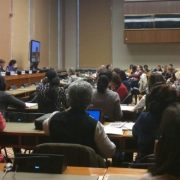The acquittal of “Belén”
As was the news in the past few months, “Belén”, the Tucuman woman who had been imprisoned for two years accused of the murder of her newborn baby in a hospital, was acquitted by the Supreme Court of Tucumán on March 23 of this year.
“Below, we offer a google translate version of the original article in Spanish. This translation may not be accurate but serves as a general presentation of the article. For more accurate information, please switch to the Spanish version of the website. In addition, feel free to directly contact in English the person mentioned at the bottom of this article with regards to this topic”
In the first instance, “Belén” had been accused of “homicide aggravated by the bond and treachery.” The Criminal Chamber sentenced her to 8 years in prison considering her state of puerperium as a mitigating factor. That conviction was based on testimony from doctors, nurses and police officers who were in the hospital that day, saying that “Belén” had had a premature birth in the hospital bathroom and had dumped the baby into the toilet.
However, the judicial process suffered from serious breaches of due process guarantees, among which we can mention: it was never found that the body found was indeed a child of “Belén” because no DNA tests were performed; She did not have an adequate legal defense, which remained passive in the recognition of the facts against the defendant’s sayings; Most of the evidence was obtained in a serious violation of professional secrecy, among others.
Since lawyer Soledad Deza, a Catholic law litigation coordinator for the Right to Decide, took her case in 2016, hundreds of social organizations that fight for women’s rights echoed and asked for the young woman’s freedom, Which took place on August 16, 2016, after having spent more than two years in prison.
We celebrate the resolution of the Supreme Court of Tucumán that at the end of March of this year, it dictated the acquittal of “Belén”, while laying the foundations on which human rights guarantees should be supported for every woman attending a medical center To be attended to.
In this sense, in the ruling and the vote of Dr. Daniel Oscar Posse, it is understood that the situation that “Belén” suffered in the hospital was institutional violence,
“Since the rupture of the commitment of professional reservation was added a succession of facts that nothing is consistent with the treatment that should receive a person in clear state of vulnerability, in this case a woman, who went to the Hospital to receive urgent medical care : It was incriminated to be the author of the fact accusing her from the first moment of lying about her alleged ignorance of her state of pregnancy; The body of the dead child was displayed as a kind of moral punishment in a box; She was subjected to medical treatment without being given any explanation about the cause and extent of it; All their rights to confidentiality and privacy were violated, in clear violation of the health team’s obligation to maintain medical secrecy, even allowing the presence of police personnel in the midst of the practice of curettage. That is to say that the incartada was absolutely relegated from its state of patient, dispensing to him from there a direct treatment like rea“.
He also stated that “despite assuming that the accused was in a situation of defenselessness, the Court (appealed) did not act accordingly to ensure that the “Belén” lawyer was deficient in the first instances of the trial, The guarantees of due process and defense at trial, but, on the contrary, used such defenses or defensive defenses to underpin the conviction of the accused “(the bold is ours).
On the other hand, it recognizes that
“All the evidentiary material of charge – apart from illegal as much in its origin and incorporation, as I exposed it when dealing with the question of the violation to the professional medical secret – is confused, ambiguous and contradictory, what nullifies any possibility of that it arrives certainty. There is not a single element of proof of charge that does not present some bankruptcy”.
He then mentions, one after another, the shortcomings of the evidence provided by the Office of the Prosecutor and valued by the Court that unjustly condemned “Belén”. In this regard, we would like once again to congratulate the clarification of the Tucuman Court when it clarifies that “it is useful to state that in the case there is another phase of verification of institutional violence against the accused, now in the judicial sphere, in addition to the one mentioned Previously occurred within the framework of medical care provided to the young woman”
Finally, in the vote indicated, it is determined that
“This institutional violence in the medical and judicial spheres is immediately embedded with the gender issue, because many of the serious shortcomings pointed out would not have been verified in a case with a man as an alleged perpetrator. In order to know if gender stereotypes were present in this process, one only has to ask: had a conviction of aggravated homicide been reached because of the attachment of a man to a cause where the body of the crime was lost and there is no data to allow Know the effective relationship between victim and perpetrator? With an autopsy with incongruities such as the sex of the victim or her gestational age and with a cause of death not clearly and precisely determined? Would it have been supported that the defense did not make any proposal in front of these situations and did not propose proof of defense? Would the defense have been allowed to occur contrary to the position of innocence sustained in the statements and words of the accused at all times?”
We understand as a fundamental pillar for the progress in the guarantee of the human rights of women, the explicit acknowledgments of institutional violence of gender by the legal operators. These kinds of resolutions based on human rights and the recommendations and observations of the committees that supervise them, make visible the seriousness of these facts and contribute to the construction of behaviors deprived of stereotypes that denigrate, violate and violate citizens.
Lastly, it is worth mentioning the vote of Dr. Antonio Gandur, when he points out that
“Considers it pertinent and necessary to carry out a thorough training process through lectures, meetings and workshops by the Human Rights Secretariat of this Court in coordination with the agencies of the Siprosa (Provincial Health System) to inform medical operators Provincial the current legal framework as well as the appropriate way of acting on issues related to the present case.”
We hope that such instances of formation will be carried out with the main objective of guaranteeing the rights of the citizens, preventing and eradicating violence in the life of women, and the full enjoyment of their sexual and reproductive rights.
Contacto
Virginia Pedraza – vir.pedraza@fundeps.org
Mayca Irina Balaguer











